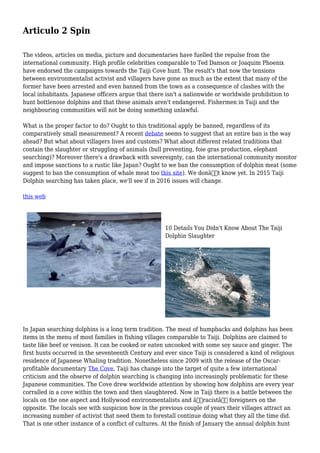
Articulo 2 Spin
- 1. Articulo 2 Spin The videos, articles on media, picture and documentaries have fuelled the repulse from the international community. High profile celebrities comparable to Ted Danson or Joaquim Phoenix have endorsed the campaigns towards the Taiji Cove hunt. The result's that now the tensions between environmentalist activist and villagers have gone as much as the extent that many of the former have been arrested and even banned from the town as a consequence of clashes with the local inhabitants. Japanese officers argue that there isn't a nationwide or worldwide prohibition to hunt bottlenose dolphins and that these animals aren't endangered. Fishermen in Taiji and the neighbouring communities will not be doing something unlawful. What is the proper factor to do? Ought to this traditional apply be banned, regardless of its comparatively small measurement? A recent debate seems to suggest that an entire ban is the way ahead? But what about villagers lives and customs? What about different related traditions that contain the slaughter or struggling of animals (bull preventing, foie gras production, elephant searching)? Moreover there's a drawback with sovereignty, can the international community monitor and impose sanctions to a rustic like Japan? Ought to we ban the consumption of dolphin meat (some suggest to ban the consumption of whale meat too this site). We don’t know yet. In 2015 Taiji Dolphin searching has taken place, we'll see if in 2016 issues will change. this web 10 Details You Didn't Know About The Taiji Dolphin Slaughter In Japan searching dolphins is a long term tradition. The meat of humpbacks and dolphins has been items in the menu of most families in fishing villages comparable to Taiji. Dolphins are claimed to taste like beef or venison. It can be cooked or eaten uncooked with some soy sauce and ginger. The first hunts occurred in the seventeenth Century and ever since Taiji is considered a kind of religious residence of Japanese Whaling tradition. Nonetheless since 2009 with the release of the Oscar- profitable documentary The Cove, Taiji has change into the target of quite a few international criticism and the observe of dolphin searching is changing into increasingly problematic for these Japanese communities. The Cove drew worldwide attention by showing how dolphins are every year corralled in a cove within the town and then slaughtered. Now in Taiji there is a battle between the locals on the one aspect and Hollywood environmentalists and ‘racist’ foreigners on the opposite. The locals see with suspicion how in the previous couple of years their villages attract an increasing number of activist that need them to forestall continue doing what they all the time did. That is one other instance of a conflict of cultures. At the finish of January the annual dolphin hunt
- 2. started despite the rising pressures from activist and animal rights NGOs. The conservation group Sea Shepherd has estimated that around 250 dolphins have been killed in only a few hours and more than 50 have been captured to be offered in aquatic parks. This can be a very profitable activity that studies millions of dollars. Activist describe how grotesque is the process of dolphin hunting. The dolphins are cornered in the cove and fishermen run over the pod with skiffs and forced them into the nets to be slaughtered. For fishermen this is merely a conventional way of fishing. They claim that it is not because of them that any species of dolphins and cetaceans could be extinguished. If any, big fishing and whaling firms should be accused. Their hunt may be very local. They have been doing it for hundreds of years and the fact that there are nonetheless many dolphins and humpbacks in the area is evidence that their intervention isn't harmful for the conservation of these species.